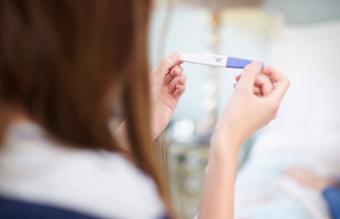
One of the lesser known symptoms of early pregnancy, implantation bleeding only occurs for some women. Though not always noticeable, implantation bleeding may occur when the fertilized egg implants itself on the wall of the uterus.
Recognizing Implantation Bleeding Symptoms
Six to 12 days after the egg is fertilized, it will implant itself into the uterus. As this takes place, a very small amount of the uterine lining may be disturbed or released. This small amount of blood may show up as spotting, bleeding, or light pink discharge. Most women do not experience implantation bleeding, and it is not considered an obvious sign of pregnancy; physicians estimate that less than 1/3 of women will experience implantation bleeding. If you're not among the women who experience this bleeding, don't interpret it as a sign you're not pregnant; you may need to wait and see if other signs of pregnancy occur or check to see if you get a positive pregnancy test.
Light Discharge
If implantation bleeding does occur, it is often very light. Some women experience just a slight spotting for a few hours, while others may experience it over several days. The bleeding is not as heavy or dark as a period, and many women may mistake it for the light pink spotting that can sometimes occur between periods. What does implantation bleeding look like on toilet paper? The discharge is usually light pink or brown and very scanty; some women may only notice it on toilet tissue and see light blood when wiping, while others may need a light panty liner.
Implantation Cramping
Frequently implantation bleeding is accompanied by a mild to moderate cramping sensation as the egg attaches to the uterine wall. This implantation cramping is common and may occur as early as seven days before your missed period. Implantation cramping can vary in severity, with some women describing it as similar to menstrual cramps or the feeling that their period is about to begin. Frequently this cramping will continue past the time when your period is due as your uterus begins to stretch.
Bleeding Before Your Period is Due
Implantation can occur anywhere from 6 to 12 days after ovulation. This means that you may experience implantation bleeding up to a full week before your period is due. Implantation bleeding may also occur right around the time your period is due. In fact, some women may mistake the light spotting as a light period when it is accompanied with implantation cramping.
Confirming Your Symptoms
If you have experienced what you believe to be implantation bleeding, wait until at least one day past the time you believe your period should have started to take a pregnancy test. Because implantation bleeding can occur so early in your cycle, you may not have enough of the pregnancy hormone yet to get a positive test at the time you experience the light pink bleeding bleeding. Always follow up with your doctor after a positive pregnancy test.
When to Worry About Implantation Bleeding or Any Bleeding
Pregnant women should be concerned about bleeding if it is heavy, bright red, contains clots, or is accompanied by severe cramps or discomfort. Implantation bleeding may also occur after artificial insemination. If bleeding is persistent, contact your physician as soon as possible. You should also contact your doctor if you have any concerns, questions or feelings of unease accompanying the bleeding.
Part of a Normal Pregnancy
Bleeding during early pregnancy can occur in 20 to 30 percent of all pregnancies. If you believe yourself to be pregnant and have experienced light bleeding or spotting, relax; it may just be a normal sign of a healthy pregnancy.







